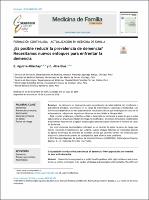| dc.contributor.author | Agirre Milachay, A. | |
| dc.contributor.author | Alva Díaz, C. | |
| dc.date.accessioned | 2020-07-02T13:12:13Z | |
| dc.date.available | 2020-07-02T13:12:13Z | |
| dc.date.issued | 2018-10 | |
| dc.identifier.citation | Semergen. 2018; 44 (8). | es_PE |
| dc.identifier.issn | 1138-3593 | |
| dc.identifier.uri | https://hdl.handle.net/20.500.12959/792 | |
| dc.description.abstract | Los diferentes tratamientos de la demencia no han probado tener resultados clínicos que modifiquen el curso de la enfermedad o reduzcan su impacto en términos de discapacidad o mortalidad. Esta revisión señala que es factible evitar el desarrollo de la demencia a pesar que la edad sigue siendo un importante factor de riesgo no modificable. El control de factores modificables ampliamente reconocidos y ligados etiopatogénicamente pueden disminuir el número de casos de demencia. Las intervenciones multimodales enfocadas en el control de estos factores de riesgo aún tienen resultados inconsistentes. Se indica que deberían ser realizados nuevos ensayos además de aplicar el enfoque de medicina de precisión clínica que permita contar con evidencias que mejoren la toma de decisiones en salud pública para afrontar este problema. | es_PE |
| dc.description.abstract | Dementia is recognised as a public health problem with high incidence and prevalence, as well as an increase in its burden of disease and associated with mortality. The different treatments have not provided clinical results that modify the course of the disease or reduce
its impact in terms of mortality or disability.
This review indicates that it is feasible to avoid the development of dementia despite the fact
that age continues to be an important non-modifiable risk factor. The control of widely recognised modifiable and aetiopathogenically-related factors can decrease the number of cases of
dementia.
Multimodal interventions focused on the control of these risk factors continue to show inconsistent results; therefore, new trials should be carried out in addition to applying the clinical
precision medicine approach that provides evidence to improve public health decision-making
in order to address this problem. | |
| dc.format | application/pdf | es_PE |
| dc.language.iso | spa | es_PE |
| dc.publisher | Sociedad Espanola de Médicos de Atención Primaria (SEMERGEN) | es_PE |
| dc.relation.uri | https://www.sciencedirect.com/science/article/abs/pii/S1138359318303125?via%3Dihub | |
| dc.rights | info:eu-repo/semantics/openAccess | es_PE |
| dc.rights.uri | https://creativecommons.org/licenses/by/4.0/ | es_PE |
| dc.subject | Demencia | es_PE |
| dc.subject | Prevención Primaria | es_PE |
| dc.subject | Factores de riesgo | es_PE |
| dc.subject | Dementia | |
| dc.subject | Primary prevention | |
| dc.subject | Multimodal | |
| dc.subject | Primary health care | |
| dc.subject | Risk factor | |
| dc.title | Es posible reducir la prevalencia de demencia? Necesitamos nuevos enfoques para reducir la demencia | es_PE |
| dc.title.alternative | Is it possible to reduce the prevalence of dementia? New approaches are needed
to deal with dementia | |
| dc.type | info:eu-repo/semantics/article | es_PE |
| dc.subject.ocde | https://purl.org/pe-repo/ocde/ford#3.02.26 | es_PE |
| dc.subject.ocde | https://purl.org/pe-repo/ocde/ford#3.02.25 | es_PE |
| dc.publisher.country | PE | es_PE |
| dc.identifier.doi | https://doi.org/10.1016/j.semerg.2018.07.002 | |






